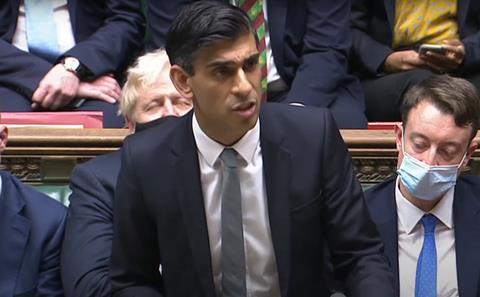Policy was one highlight of budget and autumn spending review otherwise light on new construction spending
Firms will be spared from paying higher business rates after making improvements to their properties under a new tax relief policy announced in today’s budget and spending review.
Rishi Sunak said the business rates relief will start in 2023 and will last for 12 months, enabling businesses to make improvements to their premises as staff return to the workplace.
Speaking at the dispatch box this afternoon, the chancellor said: “That means a hotel adding extra rooms, a manufacturer expanding their factory, an office adding new air-conditioning, CCTV or bike shelters will all pay no extra rates”.

A new investment relief will also be provided to encourage businesses to install green technologies like solar panels, with the two tax relief policies adding up to a combined £750m investment from the government.
The announcements came in a budget and spending review speech that was otherwise light on new pledges for construction, a sector which has taken much of the limelight during this parliament. However, the chancellor appears to have delivered on some important infrastructure spending commitments.
Construction is mentioned just four times in the 202-page budget and spending review document published by the Treasury today, with one of those being for a new frigate.
Instead, the focus of today’s announcements was on helping other sectors which have been battered by the covid pandemic to recover, including hospitality, with reforms to duty on alcohol.
Given construction’s exemption from closing during lockdowns and the industry’s explosive growth earlier this year, it is not a surprise that other sectors received more attention today.
There was no mention of HS2 or the Northern Powerhouse Rail, with Sunak vaguely promising that the Integrated Rail Plan which will outline the future of these projects would be published “soon” - a line which has been repeated by the government for several months now.
A national retrofit programme to increase the energy efficiency of homes with insulation and other improvements was also notably absent.
But Sunak still confirmed some meaningful policies which the industry will welcome, including £3.9bn for decarbonising buildings over the next four years, announced in last week’s heat and building’s strategy.
And a huge prison building programme, the biggest in a century, was confirmed with £3.8bn going towards 20,000 new prison places across England and Wales by the mid-2020s.
Up to £1.7bn of new funding was unveiled to enable a large-scale nuclear project during this parliament, with the government still in talks with energy giant EDF over the proposed Sizewell C plant in Suffolk.
From 2023, tax exemptions for eligible plant and machinery used for onsite green energy generation and storage will also be introduced along with a 100% relief for heat networks.
Museums and galleries will get £800m to upgrade and renovate their buildings, while £760m will be given to sports and youth clubs to fund new buildings and sports pitches.
For infrastructure, £1.5bn of new money will be added to a host of existing announcements, including £5.7bn for eight city regions to transform their local transport networks.
It includes £830m for West Yorkshire, £1bn each for Greater Manchester and the West Midlands, £710m for schemes in the Liverpool City Region, £570m for South Yorkshire, £310m for the Tees Valley and £540m for the West of England.
But confirmation of a 4% tax on the profit of developers with annual profits of more than £25m, a policy announced in February, will be less welcome. Starting in April 2022, it will support grant funding of more than £5bn to remove unsafe cladding from high risk buildings.
And a decision to increase the national living wage by 6.6% to £9.50 an hour will add a further cost burden on construction firms, particularly SMEs, already buckling under soaring prices for materials, labour and energy.
Sunak said today’s budget was all about building a stronger economy, billing it as the start of a new “age of optimism”.
But industry firms are likely to be underwhelmed by policies which add to their costs while failing to properly address existing pressures which have emerged during the pandemic recovery.



























No comments yet